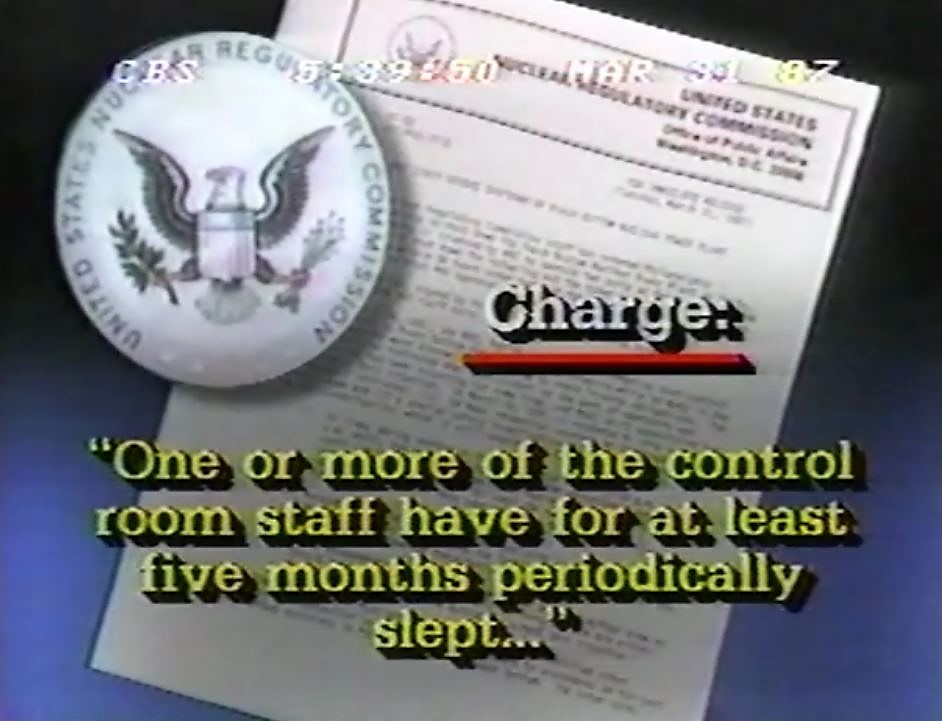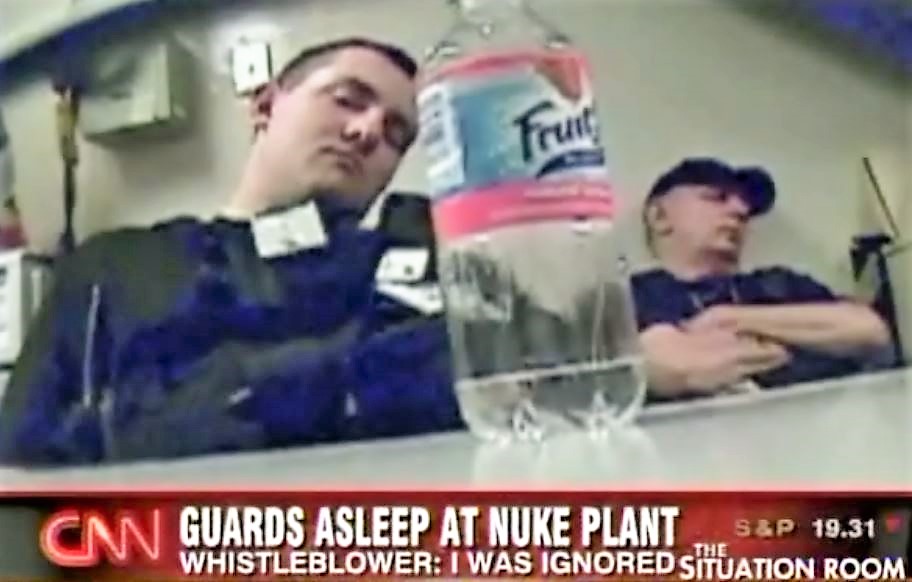Role of Regulation in Nuclear Plant Safety 9
The Peach Bottom Atomic Power Station in Delta, Pennsylvania is known for its tireless workers. They stop working long before getting tired and nap while on duty. The Nuclear Regulatory Commission (NRC) treated the nuclear nappers as naughty in 1987 but as nice in 2007. The reason for such disparate handling of the same problem isn’t apparent. Maybe if I took a nap it would come to me in a dream.
Peach Bottom is home to three reactors. Unit 1 was a high temperature gas-cooled reactor that got its operating license in January 1966 and was permanently shut down in October 1974. Units 2 and 3 are boiling water reactors that began operating in 1974.
Naughty Nuclear Nappers in 1987
On March 31, 1987, the NRC ordered both operating reactors at Peach Bottom to be shut down. The NRC had received allegations that control room operators were routinely sleeping in the control room. Victor Stello, the NRC’s Executive Director for Operations, wrote in the order:
… it is apparent that the licensee, through its enforcement history and from what has been developed by the ongoing investigation, knew or should have known of the unwillingness or inability of its operations staff to comply with Commission requirements, and has been unable to implement effective corrective action. Consequently, the NRC lacks reasonable assurance that the facility will be operated in a manner to assure that the health and safety of the public will be protected. Pending the development of other relevant information, I am unable to determine that there is reasonable assurance that the facility will be operated in a manner to assure that the health and safety of the public will be protected. Accordingly, I have determined that continued operation of the facility is an immediate threat to the public health and safety.

Fig. 1 (Source: CBS Evening News, March 31, 1987)
Nucleonics Week reported on August 18, 1988, that the NRC proposed a then-record $1,250,000 fine on the company and fines ranging from $500 to $1,000 for 33 of the plant’s 36 licensed operators for the nuclear naps. The remaining three operators were cited for violating federal regulations, but not fined.
The NRC issued amendments to the operating licenses for Peach Bottom Units 2 and 3 on March 22, 1989, to add limits on how many hours the operators could work. The added requirements limited hours worked in any 24-hour period to 16, 24 hours worked in any 48-hour period, and 60 hours in any week. The amendment wasn’t clear whether hours sleeping on duty counted against the limits or not.
Unit 2 remained shut down until May 22, 1989, while Unit 3 remained shut down until December 11, 1989. The outages lasted longer than two years not to let the operators get plenty of rest but to remedy the many problems caused by the same inadequate management oversight that condoned operators sleeping in the control rooms.
Nice Nuclear Nappers in 2007
On March 27, 2007, the NRC received allegations that individuals working for the contract firm providing security at Peach Bottom were routinely sleeping in the “ready room” and that management of the security contractor and the plant owner knew about it. (The “ready room” is where armed responders wait. When security force personnel in another room monitoring video cameras and sensors detect unauthorized intruder(s), the armed responders are deployed to deter the intrusion.)
On April 30, 2007, the NRC wrote the plant owner a letter asking whether security officers were inattentive on duty. On May 30, 2007, the owner wrote back to the NRC saying that security officers were properly attentive, and that additional radio checks and periodic post checks were being instituted to boost and sustain that attentiveness level.
In mid-June 2007, a security officer informed security management about his videotapes showing fellow security officers still sleeping on duty. In late June 2007, the security officer was instructed by security management to stop videotaping sleeping security officers. On August 22, 2007, NRC inspectors confirmed that security officers were attentive while on duty.
On September 10, 2007, WCBS-TV (New York City) broadcast videos of security officers sleeping at Peach Bottom on June 9, June 20, and August 10, 2007. On September 17, 2007, the security officer who reported sleeping security officers to security management, plant management, and the NRC was suspended due to “trustworthiness concerns.”

Fig. 2 (Source: CNN Situation Room, September 2007)
The ensuing NRC investigation commended the company’s handling of the situation and reported:
Overall, Security Plan implementation provided assurance that the health and safety of the public was adequately protected at all times. Notwithstanding, the security officer inattentiveness adversely impacted elements of the defense-in-depth security strategy. In addition, actions by security guard force supervision were not effective in ensuring that unacceptable security officer behavior was promptly identified and properly addressed.
The NRC asked other owners on December 12, 2007, about their ways and means for maintaining security officers who were bright-eyed or bushy-tailed (not both, both attributes would not have passed the backfit rule) while protecting nuclear power plants. The NRC’s mandate clearly resulted from the nuclear nappers at Peach Bottom, but it did not mention the incidents, the company’s name, or the plant’s name for unknown reasons.
The NRC did not order either Peach Bottom reactor to reduce power, yet alone shut down.
The NRC did not fine the company, Exelon, or the napping security officers.
Instead, the NRC issued a White finding to the company on February 12, 2008, for the inattentive security officers. If you ever had to have a bad report card signed by your parents or paid a nickel for an overdue library book, you suffered a harsher sanction than NRC imposed for the nice nuclear nappers.
UCS Perspective
There were two sequences involving nuclear nappers at Peach Bottom. The series leading up to the March 1987 shutdown order did not involve an operator nodding off, but rather a deliberate practice of sleeping on duty with management’s awareness and tolerance.
The series leading up to the February 2008 White finding also did not involve one security officer nodding off at his or her post, but rather a sustained practice of sleeping on duty with management’s awareness and tolerance.
Clearly, the NRC considered the nuclear nappers to be naughty in one case and nice in the other.
Such disparate regulatory response to the same underlying situation means that one series represented over-regulation and the other was under-regulation. My vote on which goes where should be obvious. I’ll leave it up to the reader to place the 1987 series into either the under-regulation or over-regulation bin, with the 2007 series going into the other bin.
Two wrongs still don’t make a right, so these two cases cannot be melded into one just-right regulation story. That just wouldn’t be right.

* * *
UCS’s Role of Regulation in Nuclear Plant Safety series of blog posts is intended to help readers understand when regulation played too little a role, too much of an undue role, and just the right role in nuclear plant safety.
